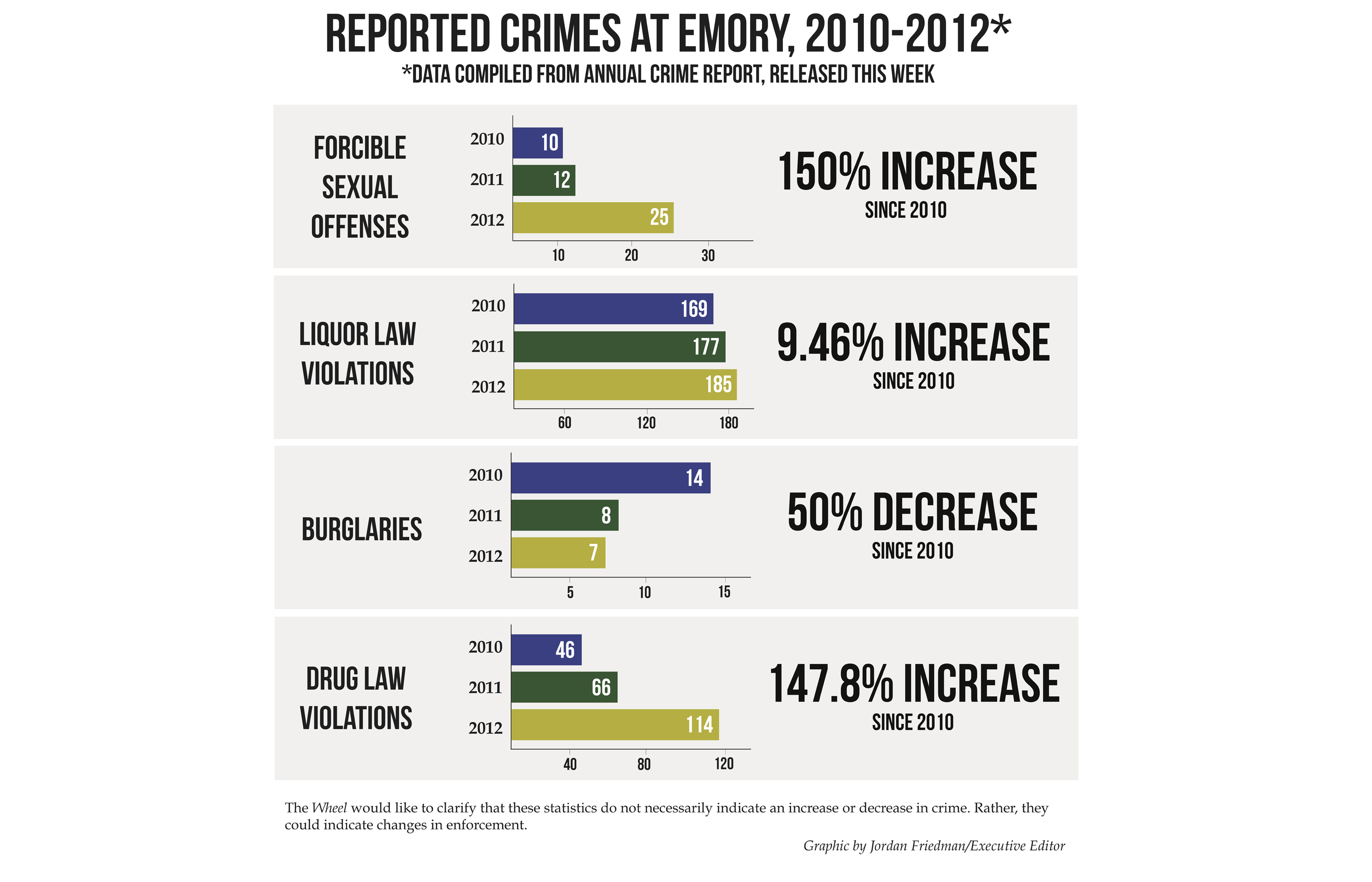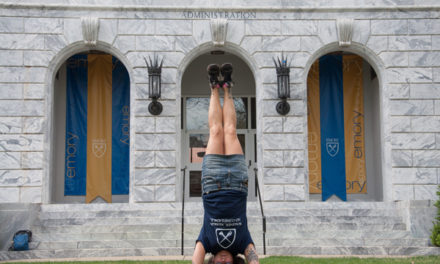In the past three years, reported forcible sex offenses have increased 150 percent, reported drug law violations with disciplinary referrals have risen 148 percent and reported liquor law violations with disciplinary referrals increased 9.46 percent, according to Emory’s annual security report released via a University-wide email this week.
Emory releases the Annual Security Report, Annual Fire Safety Report and Statement of Campus Security Policy in accordance with the “Jeanne Clery Disclosure of Campus Security Policy and Campus Crime Statistics Act,” which mandates all colleges that receive federal funding to release crime and violation statistics, as well as the “Higher Education Opportunity Act,” which details numerous reporting requirements.
In 2010, 10 forcible sex offenses were reported; in 2011, there were 12; and in 2012, 25.
Meanwhile, 46 drug law violations were reported in 2010, then 66 in 2011 and 114 in 2012.
In 2010, 169 liquor law violations were reported, followed 177 and 185 in 2011 and 2012, respectively.
Reported burglaries decreased 50 percent in the three years, from 14 in 2012 to seven in 2010.
The Emory Police Department (EPD) compiles these statistics based on the information that they receive directly as well as crimes reported to other campus security and local police, according to this year’s report.
Senior Associate Dean and Director of Campus Life External Relations Life Andy Wilson said his office takes the increase in violations very seriously and that his office will continue to educate, monitor and enforce alcohol and drug policies.
Wilson added that he believes changes in protocol and some additional training practices that Residence Life and Housing implemented in 2012 may be related to the enforcement of the drug polices in particular in the residence halls. This enhancement may have prompted the increase in reported drug law violations on the main campus, he said.
According to Senior Communications Officer Beverly Clark, nearly all the forcible sex offenses in the statistics were reported anonymously through Emory’s Respect Program.
“The University works proactively to build a safe community,” she wrote in an email to the Wheel. “According to the Clery Center for Security on Campus, colleges and universities that are effectively educating their students and responding to victims may likely have higher numbers of sexual misconduct cases reported to campus officials.”
Clark added that Emory treats all complaints and accusations of sexual misconduct seriously.
“[Emory] provides multiple resources to students, faculty and staff for outreach, support, reporting and advocacy,” she wrote, citing appointed coordinators to serve the affected, Creating Emory, the programs administered by the Respect Program.
Lauren Bernstein, the assistant director of the Respect Program, wrote in an email to the Wheel that sexual violence is a “pervasive public-health problem” affecting about one in four women and one in 33 men on college campuses nationwide.
“Increased reporting is actually a positive sign that more students are coming forward and getting help who have survived sexual violence,” she said.
Clark explained that the Respect Program helps facilitates Creating Emory – a first-year Orientation program – as well as a sexual misconduct prevention and advocacy training for student leaders and staff, including Orientation leaders and resident advisors, among many other initiatives.
Additionally, Emory has appointed a University Title IX Coordinator and Title IX Coordinator for Students, who serve as an initial point of contact for students affected by sexual misconduct, she wrote. Title IX of the Education Amendments of 1972 is “a federal civil rights law that prohibits discrimination on the basis of sex in federally-funded education programs,” she wrote.
College junior Abi Averill said she does not know if these statistics surprise her.
“I feel like most students on Emory’s campus, and honestly at every college around the country, are taking part in drinking and drugs,” she wrote in an email to the Wheel. “It is really only the sexual assault statistic that scares me. While drinking and doing drugs are personal decisions, a ‘forcible sex offense’ isn’t something that I, or any other student, can control in our own lives – and that definitely scares me.”
She added that the rise may be due to an increased “effort to realistically portray what is actually going on around campus” because she hasn’t seen student behavior change that much in three years.
“I think that Emory as a whole is a pretty safe place to be – at least I always feel safe, but I would say that with regards to sexual assault I think that more could be done,” she wrote. “I think that it starts with accurately reporting all sexual crimes on campus, despite how that might look for the University.”
Averill also said Emory should place more emphasis on organizations like the Sexual Assault Peer Advocates.
College junior Anusha Ravi, vice president of advocate management for Sexual Assault Peer Advocates (SAPA) , wrote in an email to the Wheel that she highly doubts that the increase in numbers indicates a rise in offenses.
“There’s no concrete evidence to prove that more rapes and sexual assaults are taking place,” Ravi wrote. “However, there is strong evidence that groups on campus are promoting more awareness for the issues of sexual assault and rape and are educating students on how to report and their options after an assault.”
If you have been affected by sexual violence, you have support at Emory. For confidential support, contact Lauren (LB) Bernstein in the Respect Program at 404.727.1514 or respect@emory.edu.
–By Karishma Mehrotra and Dustin Slade
Graphic by Jordan Friedman
Corrections (10/4 at 10:30 a.m.): The original article incorrectly stated that there were 144 drug law violations in 2012 and that there was a 213 percent increase in drug law violations in the last three years. There were 114 drug law violations in 2012, which is an increase of 148 percent over the last three years.
Lauren Bernstein is the Assistant Director of the Respect Program, not the Respect Program’s coordinator.
College junior Abi Averill said Emory should place more emphasis on the group Sexual Assault Peer Advocates, not Sexual Assault Prevention Association.
The Respect Program does not facilitate Creating Emory alone, it helps facilitate Creating Emory.
The Emory Wheel was founded in 1919 and is currently the only independent, student-run newspaper of Emory University. The Wheel publishes weekly on Wednesdays during the academic year, except during University holidays and scheduled publication intermissions.
The Wheel is financially and editorially independent from the University. All of its content is generated by the Wheel’s more than 100 student staff members and contributing writers, and its printing costs are covered by profits from self-generated advertising sales.





